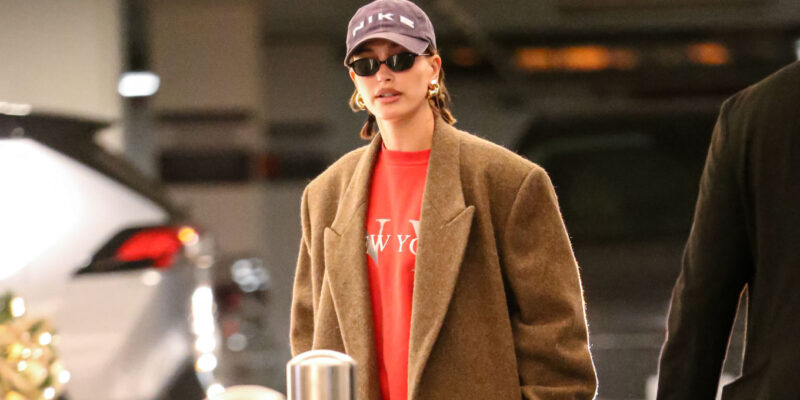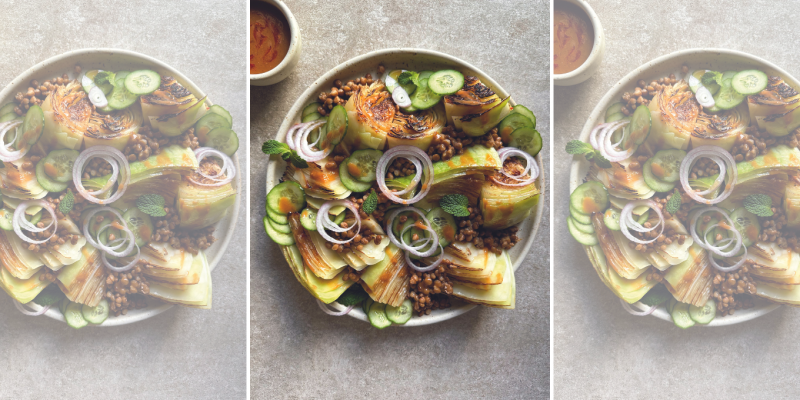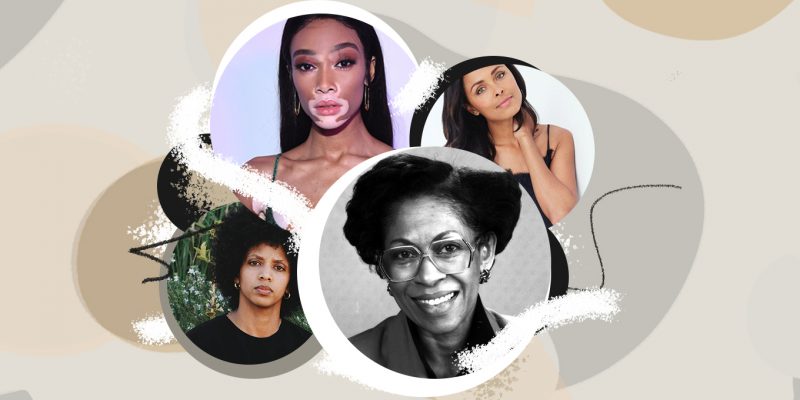Food & Drink
Ren Navarro Is Pushing for a More Inclusive Canadian Beer Industry
“I’m just a human who wants things to be better for future generations. I’m going to try really hard to at least leave my patch of grass better."
by : Aman Dosanj- Nov 17th, 2023

SARA GEIDLINGER
“Beer has never been for everyone,” says Ren Navarro of Canadian consulting service B. Diversity. Scanning her home office in Kitchener, Ont., Navarro (who also happens to be a close friend of mine) points to a few old sexist beverage ads, the likes of which were rampant in the 1950s and ’60s. With casual statements like “Don’t worry darling, you didn’t burn the beer!” (that one was from Schlitz Brewing Company, once the largest brewer in the U.S. and now part of Pabst), the ads featured women as either swimsuit-wearing accessories or the punchline. Even today, white, straight, cis-gendered men still dominate much of the brewing industry globally. But it wasn’t always this way; women were, in fact, the original brewers. From Ninkasi—the ancient Sumerian goddess of beer and brewing in what is now Iraq—to the brewster nuns of medieval Europe, women were once responsible for much of the world’s pre-industrial beer production. “We forgot about women and pushed them out of the historical books,” says Navarro. “Once men realized they could monetize beer, a big shift happened. So, when I think about who’s left out of it, [it’s] everyone except men. I think there is a pecking order.”
After spending the first part of her professional career in customer service and corporate insurance, Navarro accidentally stumbled into the beer industry as a part-time retail-store associate at Great Lakes Brewery in Etobicoke, Ont. She found that she was fascinated by the artistry and alchemy associated with craft brewing, and that initial stint turned into a six-year career in beer sales. “People were like, ‘How does it feel to be a Black woman selling beer in Ontario?’” she recalls. Burnt-out by the 24-7 nature of sales (and being asked the same tedious question), Navarro founded Beer. Diversity. in 2018 to talk about her experiences as a queer woman of colour navigating the problematic world of beer. “The company was cobbled together like Frankenstein’s monster,” she says. “I thought it would last six months [and my belief ] that beer is actually for everyone [would be] proven wrong. Five years later, here I am.”
“I thought it would last six months [and my belief ] that beer is actually for everyone [would be] proven wrong. Five years later, here I am.”
With an estimated 1,200 breweries today, the booming Canadian beer industry contributes $13.6 billion annually to the country’s gross domestic product. But what’s not known by most on the outside (and, let’s face it, many within) is the alarming rate at which marginalized and racialized folks are quietly exiting the field due to unsafe working conditions, racial harassment and sexual abuse. “[Breweries may] have diverse staff, but they don’t know what to do with them,” says Navarro. “When things are going downhill, they’re not stepping up to support them or [give them] the tools they need to get through. A lot of women have left because of [their] frustration from people being like: ‘Oh, you’re a woman brewer; isn’t that cute? Let me talk to the real brewer.’”
With mounting anti-Black racism and outrage after the killings of George Floyd and Breonna Taylor in 2020 and the subsequent Black Lives Matter movement, breweries turned to Navarro for help in how to do better and be better (including everything from staff diversity, equity and inclusion [DEI] training to drafting codes of conduct and value statements for staff and patrons alike). “I was seeing a lot of breweries partnering up with other breweries,” she says. “At the time, [they were] shutting down trolls who were like: ‘Shut up. Just make beer; don’t be political.’ But they were fighting back, taking a stance, making [collaborative] beers with amazing organizations and amplifying voices.” Nowadays, the activist admits that those kinds of stories are few and far between. “The strength in numbers has fallen off, and I’d almost argue that we’ve undone all the good we did over the past three years.” During an “eye-opening” trip to Halifax this past summer, she found that only five Nova Scotia breweries (2 Crows, Good Robot, North Brewing, Big Spruce and Boxing Rock)—compared to 15 in 2020—were still actively involved in a follow-up session to discuss the state of the industry and share DEI wins, losses and stalls from the past three years. “They’re just tired of it. Everyone’s slapped a [rainbow] ‘Everyone is welcome’ sticker on the window and called it a day,” she explains. “The thing that’s happened in the last while is that people are like, ‘Ren will take care of it.’ But no one’s taking care of me.”
“The thing that’s happened in the last while is that people are like, ‘Ren will take care of it.’ But no one’s taking care of me.”
Over the years, Navarro has tried to be honest about the problems associated with beer. That, in turn, has made her a regular target for delusional ride-or-die beer fans, some of whom also work in the industry. “If anything, being locked up for two or three years has made us incredibly feral and uncaring,” she says. But making some of her posts private on Instagram or blocking people on X (formerly known as “Twitter”) is one thing; having to call in security for a public talk after a cybertroll threatened to cause her physical harm IRL is another. “I reluctantly love the industry,” explains Navarro. “I’m just a human who wants things to be better for future generations. I’m going to try really hard to at least leave my patch of grass better. In the future, I hope the people who believe in the good speak louder.”
Navarro hopes that breweries use their platforms to showcase more of the positive—rather than just talking hop varieties— to stop others from leaving the industry. “You don’t have to tell us what you don’t believe in,” she says. “Tell us about the stuff you love, the people you love and the community groups you’re learning from. Don’t be afraid to say some- thing, because if you say it loud enough, there’s someone out there saying ‘Hey, me too.’” What’s remarkable is that a visibly exhausted but defiant Navarro continues to show up for the often thankless job despite the heavy emotional toll it takes on her. “Because I’m Charlie Brown and the beer industry is Lucy with the football, and one day, I’m gonna kick it,” she says with a smile.
DRINK MINDFULLY WITH THESE TIPS FROM REN NAVARRO
CHECK IF BREWERIES HAVE A VALUE STATEMENT POSTED: “A value statement or code of conduct should be public and easy to find on-site. If it’s not, check the brewery’s Instagram account. There’s no guarantee of safety, but they can try really hard.”
LOOK FOR INCLUSIVE TAPROOMS: “I don’t care about who is working [at a brewery]; I care about who is sitting in [its public] space. Is there age divers- ity? Is it accessible for a wheelchair, walker or stroller? It might be that they’re in a neighbourhood where there are a lot of young families, so they should make them feel welcome.”
DOWNLOAD THE FREE NOTME APP: “You can use it to report anything you’ve seen or experienced; you just scan a QR code or punch in a pin. If someone had to leave [an event or space] because they felt unsafe or were threatened with harm, it can still be reported. A bunch of festivals have started bringing it in; Parallel 49 [in Vancouver] got it for staff and patrons. I really love it.”
WHAT’S IN REN NAVARRO’S BEER FRIDGE

Parallel 49 Space Kitty IPA
“A great hazy IPA with tropical- fruit notes and a full
malt backbone.”

Big Spruce Brewing Kitchen Party Organic Pale Ale
“A full-bodied beer that goes down easily. Perfect for a kitchen party.”

North Brewing Company Pleasant Disposition IPA
“There’s a sloth on the label! This is a tasty beer best enjoyed with friends.”

2 Crows Brewing Co. Atlantic Canada’s Light Lager
“As I get older, I’m leaning harder toward lagers, and this is one of my absolute favourites. It’s light, crisp and refreshing.

Bellwoods Brewery Stay Classy Non-Alcoholic IPA
“Honestly, it’s one of the best non-alcoholic craft beers out there.”

Short Finger Brewing Co. Katherine the Mild
“Low [alcohol] percentage, big flavours. I’m always so happy when this dark mild is available.”
Newsletter
Join our mailing list for the latest and biggest in fashion trends, beauty, culture and celebrity.
Read Next

Beauty
Balayage Hair Ideas You Need For Your Next Trip To The Salon
Caramel hair is but a click away.
by : George Driver- May 3rd, 2024

Culture
Why Are People Obsessing Over Whether Hailey Bieber Is Pregnant?
Despite no word from the woman herself, the Rhode founder has become the subject of discussion on the internet as fans have been debating whether or not she is pregnant.
by : Naomi May- May 2nd, 2024

Fashion
8 Sparkling Jewellery Gifts to Give This Mother’s Day
Show your gratitude with pieces they’ll have forever and ever.
by : ELLE Canada- Apr 29th, 2024




